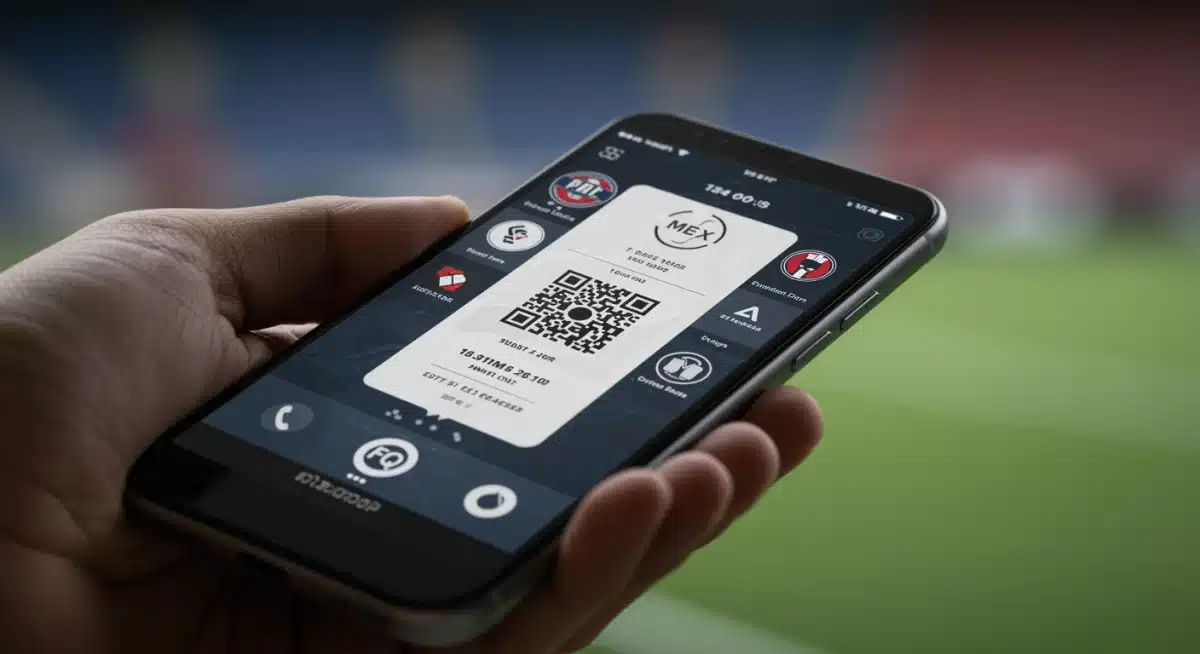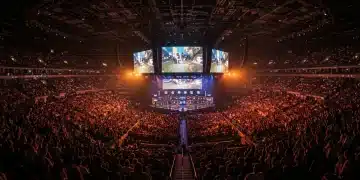MLS Digital Ticketing Trends 2025: A 3-Month Update

Anúncios
Major League Soccer (MLS) is actively adapting to new digital ticketing trends for 2025, prioritizing seamless fan entry, enhanced security, and personalized experiences through mobile-first and blockchain-enabled solutions.
Anúncios
How Major League Soccer (MLS) Events are Adapting to New Digital Ticketing Trends for 2025: A 3-Month Update (RECENT UPDATES) reveals a dynamic shift in how fans experience live soccer. As technology continues to reshape industries, sports, particularly MLS, are at the forefront of embracing innovation to enhance fan engagement and operational efficiency. This evolution promises a more secure, convenient, and personalized journey for every attendee.
the digital revolution in mls ticketing: a strategic overview
The landscape of event ticketing has undergone a profound transformation, with Major League Soccer leading the charge in adopting cutting-edge digital solutions. This strategic pivot is not merely about convenience; it encompasses security, data analytics, and an elevated fan experience. The journey towards fully digital ticketing in MLS events is accelerating, driven by both technological advancements and evolving consumer expectations.
Anúncios
MLS organizations are investing heavily in infrastructure that supports mobile-first strategies, recognizing that smartphones are now an indispensable part of fans’ lives. This move away from traditional paper tickets minimizes fraud, streamlines entry processes, and offers new avenues for engagement before, during, and after a match. The integration of various digital platforms is creating a cohesive ecosystem where ticketing is just one component of a broader fan journey.
mobile-first strategies and fan convenience
Central to MLS’s digital ticketing adaptation is the emphasis on mobile-first strategies. This involves developing robust mobile applications that serve as a central hub for tickets, stadium information, and personalized content. The goal is to make accessing events as effortless as possible, reducing friction points for fans.
- Seamless Entry: Mobile tickets allow for quick QR or barcode scans, significantly speeding up entry lines.
- Ticket Management: Fans can easily transfer or resell tickets within secure platforms.
- Integrated Experience: Mobile apps often include features like concession ordering, in-stadium navigation, and live updates.
The commitment to mobile convenience reflects a deep understanding of modern consumer behavior. Fans expect instant access and intuitive interfaces, and MLS is delivering on these expectations through continuous app development and user experience enhancements. This focus ensures that the digital ticketing experience is not just functional but genuinely adds value to the fan’s day.
Ultimately, the digital revolution in MLS ticketing is about more than just replacing paper with pixels. It’s about building a smarter, more responsive, and more engaging event experience that leverages technology to its fullest potential. The strategic overview reveals a clear path towards a future where digital ticketing is intertwined with every aspect of the fan journey, making it more dynamic and rewarding.
enhanced security measures: combating fraud and counterfeiting
One of the most significant advantages of the shift to digital ticketing in Major League Soccer is the enhanced security it provides. Traditional paper tickets were susceptible to counterfeiting and fraud, leading to significant issues for both event organizers and legitimate fans. Digital solutions, however, introduce multiple layers of protection that make unauthorized duplication incredibly difficult.
MLS teams are implementing advanced encryption and dynamic barcode technologies to ensure ticket authenticity. These measures mean that each digital ticket is unique and constantly updated, rendering static copies useless. The security protocols extend beyond the ticket itself, encompassing the entire transaction process from purchase to entry, safeguarding against illicit resales and scams.
blockchain technology: the future of ticket authenticity
A particularly exciting development in this area is the exploration and early adoption of blockchain technology for ticketing. Blockchain offers an immutable and transparent ledger for every ticket transaction, creating an unalterable record of ownership and preventing fraudulent activities.
- Immutable Records: Every ticket’s history is recorded on a blockchain, ensuring its authenticity and origin.
- Dynamic QR Codes: Tickets can feature constantly changing QR codes, making screenshots or static copies invalid.
- Smart Contracts: Blockchain-based smart contracts can automate ticket transfer rules, such as resale price caps or limitations.
The potential of blockchain goes beyond simple authentication; it can redefine how tickets are distributed, transferred, and managed, offering unprecedented levels of transparency and control. While still in early stages for widespread adoption, several MLS franchises are piloting blockchain-enabled solutions, signaling a strong commitment to future-proofing their ticketing systems. This proactive approach ensures that fans can purchase tickets with confidence, knowing their access is guaranteed and secure.
By focusing on these advanced security measures, MLS is not only protecting its revenue but, more importantly, protecting its fans from the disappointment and financial loss associated with fraudulent tickets. The move towards digital, and potentially blockchain-backed, ticketing represents a significant leap forward in ensuring the integrity of the event experience.
personalizing the fan experience through digital platforms
Beyond security and convenience, digital ticketing is fundamentally transforming how Major League Soccer teams connect with their fanbase. The data generated through digital interactions allows for an unprecedented level of personalization, tailoring the fan experience to individual preferences and behaviors. This goes far beyond simply scanning a ticket; it’s about creating a holistic and engaging journey for every attendee.
From the moment a ticket is purchased, digital platforms can begin to curate a personalized experience. This might include targeted communications about favorite players, exclusive content, or special offers based on past purchases or engagement. The goal is to make each fan feel uniquely valued and connected to their team, fostering stronger loyalty and enthusiasm.

The integration of ticketing data with broader CRM (Customer Relationship Management) systems enables MLS organizations to build comprehensive profiles of their fans. This data-driven approach allows for more effective marketing, personalized stadium experiences, and even custom merchandise recommendations. The era of one-size-fits-all fan engagement is rapidly fading, replaced by a nuanced and individualized approach.
interactive features and loyalty programs
Digital ticketing platforms are increasingly incorporating interactive features and linking directly to loyalty programs. These elements further enhance personalization and reward fan engagement, turning a simple ticket into a gateway for a richer experience.
- In-App Engagement: Polls, quizzes, and real-time updates within the ticketing app keep fans engaged before and during the match.
- Loyalty Points: Attending games, purchasing concessions, or interacting with sponsors can earn loyalty points redeemable for exclusive perks.
- Personalized Offers: Digital platforms can deliver tailored discounts on food, beverages, or merchandise directly to a fan’s device.
These interactive components not only enrich the fan experience but also provide valuable feedback to teams, allowing them to continuously refine their offerings. By making the digital ticket a central component of an interactive loyalty ecosystem, MLS is building stronger, more enduring relationships with its supporters. This personalization strategy is key to maintaining a vibrant and engaged fanbase in an increasingly competitive entertainment landscape.
operational efficiencies and environmental impact
The transition to digital ticketing in Major League Soccer events offers significant operational efficiencies for clubs and stadiums. Eliminating physical ticket production, distribution, and handling drastically reduces logistical complexities and associated costs. This streamlining allows staff to focus on more critical aspects of event management and fan service, rather than managing paper tickets.
Furthermore, digital ticketing has a positive environmental impact. The reduction in paper waste from millions of physical tickets each season contributes to sustainability efforts, aligning with a growing global emphasis on eco-friendly practices. MLS teams are increasingly mindful of their ecological footprint, and digital ticketing is a tangible step towards greener operations.
streamlined entry and data analytics
One of the most immediate operational benefits is the optimization of stadium entry. Digital scanners process tickets much faster than manual checks, leading to shorter queues and a smoother flow of fans into the venue. This improved efficiency enhances the overall fan experience from the moment they arrive.
- Reduced Staffing Needs: Automated scanning systems can decrease the number of personnel required for ticket verification.
- Real-time Attendance Data: Digital systems provide instant, accurate attendance figures, aiding in crowd management and emergency planning.
- Waste Reduction: Eliminating paper tickets significantly lowers the environmental impact of events.
The wealth of data generated by digital ticketing systems is invaluable. Clubs can analyze entry patterns, peak times, and fan demographics with precision, allowing them to make data-driven decisions that improve future event operations. This analytical capability extends to understanding fan behavior within the stadium, optimizing everything from concession stand placement to restroom availability.
In essence, digital ticketing is not just a technological upgrade but a fundamental shift towards more efficient, sustainable, and data-informed event management. MLS teams are leveraging these advantages to create better experiences for fans while simultaneously improving their operational effectiveness and environmental stewardship.
challenges and considerations for 2025
While the benefits of digital ticketing are clear, Major League Soccer’s adaptation journey for 2025 also involves navigating several challenges and important considerations. Ensuring equitable access, addressing technological divides, and managing data privacy are paramount to the successful and inclusive implementation of these new systems. It’s a complex balance between innovation and accessibility.
One primary concern is the digital divide, where not all fans may have access to smartphones or reliable internet connectivity. MLS organizations must implement robust contingency plans, such as dedicated support staff and alternative entry methods, to ensure no fan is left behind. This commitment to inclusivity is vital for maintaining a broad and diverse fanbase.
data privacy and user adoption
With increased reliance on digital platforms comes the critical responsibility of protecting fan data. MLS teams and their ticketing partners must adhere to stringent data privacy regulations and build trust with their users through transparent policies and secure practices. The potential for data breaches or misuse is a significant concern that requires continuous vigilance.
- Privacy Policies: Clear and accessible privacy policies are essential for building fan trust.
- Data Security: Robust cybersecurity measures must be in place to protect sensitive fan information.
- User Education: Campaigns to educate fans on how to use digital tickets and protect their data are crucial for widespread adoption.
Furthermore, user adoption remains a key challenge. While younger demographics are generally comfortable with digital solutions, some long-time fans may prefer traditional methods. Effective communication, easy-to-understand tutorials, and accessible customer support are necessary to facilitate a smooth transition for all fan segments. The goal is to make the digital experience intuitive enough that even less tech-savvy individuals feel comfortable using it.
MLS’s forward-thinking approach to digital ticketing requires careful consideration of these challenges. By proactively addressing issues related to accessibility, data privacy, and user adoption, the league can ensure that its technological advancements benefit all fans and strengthen the overall soccer community.
the road ahead: innovations and future outlook
Looking beyond 2025, the future of digital ticketing in Major League Soccer is poised for even greater innovation. The current adaptations are laying the groundwork for more immersive and integrated experiences that will redefine how fans interact with live sports. The continuous evolution of technology, particularly in areas like augmented reality (AR) and artificial intelligence (AI), promises exciting new possibilities.
Imagine tickets that not only grant entry but also unlock AR overlays revealing player stats as you look at the field through your phone, or AI-powered recommendations for in-stadium food based on your previous purchases. These are not distant pipe dreams but technologies that are rapidly maturing and could soon become standard features in the MLS fan experience.
integrating nfts and dynamic pricing
The concept of Non-Fungible Tokens (NFTs) is also gaining traction in the ticketing space. NFTs could serve as collectible digital tickets, offering unique fan benefits, exclusive content, or even trading opportunities. This would add an entirely new dimension to ticket ownership, transforming a temporary access pass into a valuable digital asset.
- Collectible Tickets: NFTs could become unique digital memorabilia for significant matches or events.
- Exclusive Access: NFT ticket holders might gain access to special fan zones, meet-and-greets, or unique digital content.
- Dynamic Pricing Models: AI-driven dynamic pricing can optimize ticket sales based on demand, weather, opponent, and other factors, ensuring fair pricing and maximizing revenue.
Dynamic pricing, already in use to some extent, will become even more sophisticated with advanced AI, allowing for real-time adjustments that benefit both clubs and fans. For instance, tickets for high-demand matches could be priced higher, while less popular games might see price reductions to encourage attendance, all managed seamlessly through digital platforms.
The road ahead for MLS digital ticketing is one of continuous innovation. By embracing emerging technologies and prioritizing fan-centric design, the league is not just adapting to trends but actively shaping the future of sports entertainment. The goal is to create an unparalleled live event experience that is as exciting off the field as it is on it.
| Key Trend | Brief Description |
|---|---|
| Mobile-First Adoption | MLS is prioritizing mobile apps for ticket access, management, and integrated fan experiences. |
| Enhanced Security | Advanced encryption and dynamic barcodes combat fraud, with blockchain pilots for authenticity. |
| Personalized Fan Experience | Data-driven strategies offer tailored content, offers, and loyalty programs to individual fans. |
| Operational Efficiency | Digital systems streamline entry, reduce costs, and offer valuable real-time attendance data. |
Frequently asked questions about mls digital ticketing
The core benefits include enhanced security against fraud, increased convenience for fans through mobile access, streamlined stadium entry processes, and the ability to gather valuable data for personalized fan experiences. This modernization improves efficiency and reduces environmental impact.
Blockchain technology provides an immutable record of ticket ownership, significantly enhancing authenticity and reducing counterfeiting. It enables dynamic QR codes and can facilitate smart contracts for controlled resales, offering unparalleled transparency and security for both buyers and sellers.
MLS teams are implementing contingency plans such as dedicated support staff, alternative entry methods for those without smartphones, and educational campaigns. The goal is to bridge the digital divide and ensure that all fans, regardless of their technological proficiency, can access events seamlessly.
Digital tickets, integrated with CRM systems, allow MLS teams to collect data and offer personalized content, special offers, and loyalty rewards based on individual fan preferences and past interactions. This creates a more engaging and tailored journey for each attendee.
Future innovations may include integrating augmented reality (AR) for in-stadium experiences, using AI for dynamic pricing and personalized recommendations, and potentially leveraging NFTs for collectible tickets and exclusive fan benefits, further enriching the event experience.
conclusion
The rapid evolution of Major League Soccer’s digital ticketing strategies for 2025 underscores a clear commitment to innovation, fan experience, and operational excellence. From prioritizing mobile-first solutions and bolstering security with advanced technologies like blockchain, to creating deeply personalized fan journeys and achieving significant operational efficiencies, MLS is actively shaping the future of sports event access. While challenges such as data privacy and digital accessibility remain, the league’s proactive approach signals a bright, technologically advanced future for soccer fans, promising more secure, convenient, and engaging experiences at every match.





